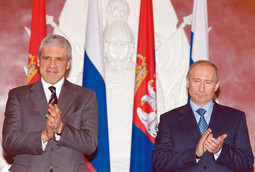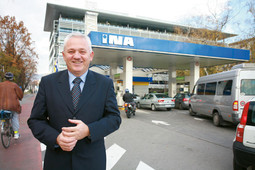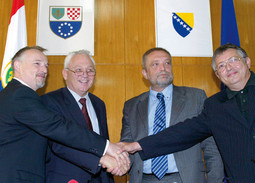Published in Nacional number 637, 2008-01-29
CROATIA'S NEW CHALLENGE
Russo-Serbian pact a blow to INA
BY CONCLUDING AN ENERGY DEAL WITH SERBIA Russia has made its greatest incursion ever towards the EU and has positioned its sphere of influence at the Croatian border
 ANTI EU DEAL Serbian and Russian Presidents Boris Tadic and Vladimir Putin were present at the closing of the energy pact, sending the European Union a clear political message On Friday, 25 January, Russia and Serbia signed in Moscow an agreement on the sale of the Naftna industrija Srbije (Serbian Oil Industry / NIS) Company to the Russian state-owned energy giant Gazprom and on the construction of a natural gas pipeline that will link Serbia to the new Russian natural gas pipeline towards the European Union. The conclusion of the energy pact has officially made Serbia the latest in a series of members to an informal new Eastern Bloc – the economic and political area of South Eastern Europe that is once again dominated by the Russian Federation.
ANTI EU DEAL Serbian and Russian Presidents Boris Tadic and Vladimir Putin were present at the closing of the energy pact, sending the European Union a clear political message On Friday, 25 January, Russia and Serbia signed in Moscow an agreement on the sale of the Naftna industrija Srbije (Serbian Oil Industry / NIS) Company to the Russian state-owned energy giant Gazprom and on the construction of a natural gas pipeline that will link Serbia to the new Russian natural gas pipeline towards the European Union. The conclusion of the energy pact has officially made Serbia the latest in a series of members to an informal new Eastern Bloc – the economic and political area of South Eastern Europe that is once again dominated by the Russian Federation.
With the entry of Russia's most powerful energy company in Serbia, Russia has further shifted its sphere of interest westwards, more exactly towards the European Union, which clearly does not have the right answer to the new form of Russian expansion, as it is itself dependent on the natural gas controlled by the Kremlin. Russia has also, by way of the deal with Serbia, come on its march on Europe to the eastern frontiers of Croatia and Bosnia & Herzegovina and, as things stand, has no intention of stopping there. As the agreement with Serbia foresees the construction of a main natural gas pipeline, that has as its ultimate goal the transit of Russian natural gas from the Black Sea to Italy, Croatia has found itself in Russia's way and it remains to be seen what position Croatian Government will take in the new circumstances. Because the fact is that the Russo-Serbian deal could have both negative and positive effects on Croatia, its economy and energy future.
The Russo-Serbian pact foresees that Gazprom, for the sum of 400 million euro, becomes the majority owner of Naftna industrija Srbije, a monopoly in oil refining and the owner of a network of 500 petrol filling stations, and that it invest a further half a billion euro into the company. Since these investments will for the most part pertain to the modernisation of the oil refineries in Pancevo and Novi Sad, there is a real danger that NIS pushes the Croatian oil company INA, which is lagging in the modernisation of its refineries, out of the leadership position in the regional petroleum derivates market. As Nacional was told by an anonymous source from the oil industry, there will be above all a change in the balance of power in Bosnia & Herzegovina, where INA is delivering fuel of lesser quality, the kind it is currently able to produce. The refinery in Bosanski Brod, also purchased by another Russian company, will gain in importance. It is also to be expected that the Russians will launch the construction of an oil terminal in the Port of Ploce for the export of derivates coming from Bosanski Brod, which will also be a blow to INA and the terminal in Omisalj. The Serbian oil industry will be in a much better position than that of INA after the Serbo-Russian agreement as it will have gained a strategically important partner, one of the most powerful global players in the oil and natural gas business. And in keeping with this, there should be no doubt that Serbia's influence in the future will be significantly greater than it is today.
 CROATIA NEEDS TO AGREE that the continuation of the South Stream natural gas pipeline runs through its territory as it only stands to gain from it, says consultant Jasminko Umicevic "The Russo-Serbian agreement is a hard blow to INA, whose future is now in doubt. As late as in 2000, INA was a regional player while today it is, regarded on the long term, a third-class oil company, as the most power global player has appeared on its own turf. It is simple - NIS becomes the extended arm of Gazprom, while INA has its strategic partner in Hungary's MOL, which cannot measure up against the Russian giant and has itself for years now been dependent on Lukoil, another Russian oil company. Little has been invested in modernising INA's facilities and it appears that MOL has used INA's resources to better position itself in the region. This is confirmed by their latest move when they bought the attractive Tifon chain of petrol filling stations. Serbia has, on the other hand, made an excellent move as it has gained a strong partner, both as regards energy and politics", says Nacional's source.
CROATIA NEEDS TO AGREE that the continuation of the South Stream natural gas pipeline runs through its territory as it only stands to gain from it, says consultant Jasminko Umicevic "The Russo-Serbian agreement is a hard blow to INA, whose future is now in doubt. As late as in 2000, INA was a regional player while today it is, regarded on the long term, a third-class oil company, as the most power global player has appeared on its own turf. It is simple - NIS becomes the extended arm of Gazprom, while INA has its strategic partner in Hungary's MOL, which cannot measure up against the Russian giant and has itself for years now been dependent on Lukoil, another Russian oil company. Little has been invested in modernising INA's facilities and it appears that MOL has used INA's resources to better position itself in the region. This is confirmed by their latest move when they bought the attractive Tifon chain of petrol filling stations. Serbia has, on the other hand, made an excellent move as it has gained a strong partner, both as regards energy and politics", says Nacional's source.
If this appraisal is borne out, that would bury the possibility that a Russian oil company could become a part owner of INA, which was in play in the first half of last year, before Russian President Vladimir Putin came to the Energy Summit held in Zagreb. There had been speculation then that Gazprom or Lukoil could buy 25 percent of INA stock from MOL. After the take over of NIS, INA will no longer be of interest to them. What is more, it will become an enemy on the market, and a much weaker one at that.
That the entry of Gazprom into Serbia is a significant rearrangement in the balance of power on the regional oil market and a danger for INA, is also the opinion of Jasminko Umicevic, the director of the London-based Oil and Gas Consulting Company and an advisor in the oil business. "Gazprom will likely take over the refinery in Republika Srpska, which means it will come within 50 kilometres from Zagreb as the crow flies. The refinery in Bosanski Brod will be modernised quickly, as it is not a significant investment for the Russians, which will seriously undermine plans to reconstruct and the survival of the INA refinery in Sisak, because the loss of market puts into question the financing of that kind of investment. What is particularly dangerous for INA is if the Russians move to build an petroleum derivates terminal in the Port of Ploce. That terminal would have a loading capacity in excess of 200 thousand tonnes, meaning it would be targeted to exportation. In comparison, the derivates terminal in Omisalj has a capacity four times smaller", says Umicevic.
Umicevic, however, feels that the appearance of the Russians on the scene can also be an advantage, when regarding the position of the Croatian oil company. "When the privatisation of NIS became an issue, there was word that MOL might sell its stake in INA to Russian Lukoil, which, based on the contract with Croatian Government, the Hungarian company is entitled to do after a five year moratorium expires. It became, namely, clear to the Hungarians over time that they would be hard pressed to gain a majority ownership position in INA, so they considered withdrawing and using the money received for INA to buy a stake in NIS. As they own Tifon in Croatia and Energopetrol in Bosnia & Herzegovina, they would with the Serbian company gain a good market position in this part of Europe. After the arrival of the Russians, however, MOL has no option but to stay on in INA, which is good for the Croatian oil company, for whom the Hungarians are essential in the modernisation of the refinery facilities", says Umicevic.
The experts are in agreement that a part of the Russo-Serbian pact, that foresees the construction of a main natural gas pipeline from Bulgaria through Serbia, plays into Croatia's hand. It would be the continuation of a massive Russian project called the South Stream, which foresees the transport of Russian natural gas from the shores of the Black Sea to the European Union, more precisely to Italy. If the Russia's fulfil the promise they have given to the Serbs, the next country they need to negotiate with is Croatia, because it is logical that the continuation of the natural gas pipeline goes with the JANAF Company.
Croatia would thereby find itself in an enviable situation thanks only to its geographic location. The connection to the Russian natural gas pipeline would resolve on the long term the issue of natural gas supply, and one should also add the financial benefits of entering the project. It is estimated that upwards of 200 million euro a year could be earned from transit duties. Given that the natural gas is purchased directly from the producer, its purchase price would be significantly lower than if purchased from an intermediary distributor. There are in that respect also significant financial benefits that industry would have from cheaper natural gas. Low energy prices also attract foreign investors to industry, because cheaper energy means greater profits.
 TOMISLAV DRAGICEVIC, the top man at INA, the Croatian oil company one of whose refineries will lose its significance with the arrival of Gazprom Criticisms that Croatia would only increase its energy dependence on Russia by connecting to the South Stream do not hold water. Independent of that project, namely, the construction of a large liquefied natural gas terminal is to start soon on the Adriatic seaboard, to be built by an international consortium headed by the German energy giant E.ON Ruhrgas. Gas would be supplied for the large part from northern African sources via the LNG terminal, whereby Croatia would receive two main supply sources.
TOMISLAV DRAGICEVIC, the top man at INA, the Croatian oil company one of whose refineries will lose its significance with the arrival of Gazprom Criticisms that Croatia would only increase its energy dependence on Russia by connecting to the South Stream do not hold water. Independent of that project, namely, the construction of a large liquefied natural gas terminal is to start soon on the Adriatic seaboard, to be built by an international consortium headed by the German energy giant E.ON Ruhrgas. Gas would be supplied for the large part from northern African sources via the LNG terminal, whereby Croatia would receive two main supply sources.
The fact is that the two projects, Gazprom's natural gas pipeline and the LNG terminal, complement one another. Indicative of that being the case is another fact: Bergmann Burckhard is a member of the Gazprom supervisory board, and is also the top man at E.ON Ruhrgas, the German gas giant that is leading the consortium that is to build the LNG terminal on the Adriatic seaboard.
That the construction of a natural gas pipeline through Serbia is a good thing for Croatia, and that the project is, if it continues on through our country, complementary to the LNG terminal, is something that Zeljko Tomsic, responsible for energy policy at the Economy Ministry, agrees with. Tomsic says that Croatia and the foreign partners, united in the Adria LNG consortium, have agreed on all points and that they await only the debate in a Government commission on the location where the terminal is to be built. A study that is to give an expert opinion on the most favourable location and on environmental impact was submitted to Government in November, ahead of the elections. The Croatian companies INA, Plinacro and HEP are to join the Adria LNG consortium in this year's first quarter. All of the preparatory work is to be concluded in the coming several months and a decision on launching construction of the terminal is to be made before the year is out. That is the deadline, as the terminal is slated to begin operations in 2011, the optimum period for securing gas capacities. Otherwise E.ON and company will turn their attention to other projects, because an LNG terminal is more important to the European Union than it is to Croatia, as it reduces energy dependence on Russia, a country that is unstoppably expanding its political influence, just like the former Soviet Union.
 INA AND MOL LEADERS Dragicevic and Hernadi during the purchase of a chain of petrol filling stations in Bosnia & Herzegovina that put MOL in a better position than INA Only, unlike the former USSR, which did so with the help of the Red Army, Russia with Putin at the helm is expanding with the help of gas and oil, sources of energy the global economy is increasingly dependent on. Russia's chief weapon in expanding its sphere of interest is in fact the state-owned Gazprom, the world's largest controller of natural gas deposits, with an ever stronger position in the oil business by way of its Gazpromnjeft company.
INA AND MOL LEADERS Dragicevic and Hernadi during the purchase of a chain of petrol filling stations in Bosnia & Herzegovina that put MOL in a better position than INA Only, unlike the former USSR, which did so with the help of the Red Army, Russia with Putin at the helm is expanding with the help of gas and oil, sources of energy the global economy is increasingly dependent on. Russia's chief weapon in expanding its sphere of interest is in fact the state-owned Gazprom, the world's largest controller of natural gas deposits, with an ever stronger position in the oil business by way of its Gazpromnjeft company.
According to official estimates, Gazprom controls about 17 percent of global natural gas deposits, uses about 20 percent of the total global natural gas supply and sells about 85 percent of Russian energy sources to the entire world, even to the United States of America. Europe gets the lion's share of its natural gas from Russia. It is estimated that Western Europe will soon have to purchase 200 billion cubic metres of natural gas each year from Russia. Regardless of all its efforts, the European Union is dependent on Russian natural gas, and that is why Brussels is not complaining about the expansion of Russian interests in the Balkan countries. What is more, they cooperate on key projects. Gazprom is building two key natural gas pipelines towards Europe with its European partners. For the North Stream that will transport natural gas from deposits in the Barents Sea to northern and central Europe, Gazprom last year chose France's Total and Norway's Statoil Hidro as its partners.
The South Stream natural gas pipeline project is of interest to Croatia is, as Russia has secured the support of all the countries whose territory was essential to complete the undertaking in less than a year. Gazprom's initial plan was to take the natural gas pipeline along the bottom of the Black Sea, from the Russian coast to Bulgaria and then on to Greece, and then by the undersea route to Italy. The scenario by which Gazprom won the agreement of the countries over whose territory the natural gas pipeline is to be built is reminiscent of a warpath. Seemingly independent of the natural gas pipeline, Vladimir Putin first signed an agreement in Athens in March of last year on the construction of a natural gas pipeline that would bypass the overly encumbered straits of Bosporus and the Dardanelles with the Prime Ministers of Greece and Bulgaria. As far as natural gas is concerned, the key deal was struck in June of last year between Gazprom and the Italian oil industry company ENI. A memorandum was signed then on the construction of a natural gas pipeline that would bring Europe 30 billion cubic metres of Russian natural gas a year by way of the Black Sea. It was agreed then that the route of the natural gas pipeline would go under the Black Sea to Bulgaria, where it would fork in two directions, southwards to Italy and northwards towards Serbia. A month earlier Kazakhstan and Turkmenistan had agreed that their natural gas could go to the West by way of Russia, and that can be considered yet another in a series of Gazprom victories in its clash with European companies.
The cost of the construction of the South Stream natural gas pipeline should come to about 15 billion dollars. If the project is realised it will be yet another blow to the European Union and its Nabucco project, an alternative natural gas pipeline that foresees the supply of natural gas from central Asia by way of Turkey to Europe, with only one goal, that of circumventing Russia.
Ten days ago, Bulgaria, a European Union Member State on whose territory the South Stream natural gas pipeline divides into two directions, agreed to the pact with Russia. Less than ten days after the deal was struck between Putin and the Bulgarian Prime Minister Sergey Stanishev in Sofia, the Russians also won over Serbia. Negotiations with the Croatian Government follow by all accounts, which has not altered its energy strategy since 2002, even though the circumstances on the European and global energy scene have changed dramatically.
Jasminko Umicevic feels it unacceptable that a country does not alter its energy strategy over a six year period in the present situation. "In normal countries, long-term plans are adjusted to the current situation. And the circumstances are today entirely different than those in 2002, when Croatian Government adopted the energy strategy. A new Russia has emerged above all, led by Vladimir Putin, who is not doing what he is doing out of arrogance, but because he is conscience of his strength. That country faced bankruptcy a decade ago, and now has the world's third largest foreign currency reserves, thanks to a hike in the price of sources of energy. Russia controls huge amounts of oil and natural gas and has all of Europe in its grip. Companies under the control of the Russian Government have yet to make serious moves on Europe and it is no wonder then that Bulgaria and Romania were so quickly accepted to European Union and NATO membership", says Umicevic.
'It does not matter on whose natural gas we are dependent'
Jasminko Umicevic, an oil energy consultant and the director of the London-based Oil and Gas Consulting Company feels that Croatia needs to agree that the continuation of the South Stream natural gas pipeline goes through its territory, as it only stands to gain. "Natural gas is the energy source of the future, it is clean and its consumption will continue to grow. To pose the question of whether it its better to depend on Russian natural gas, or on natural gas from another source, is entirely irrelevant."
Related articles
"We will decide on DruzbAdria in September"
Russian state owned company Gazprom Neft is currently considered the most likely partner to Croatia's Janaf in the DruzbAdria project. It is the… Više
Latest news
-
28.10.2010. / 14:15
'A profitable INA is in everyone's interest'
-
28.10.2010. / 09:38
Sanader’s eight fear SDP — Won’t bring down Government
-
21.10.2010. / 15:02
Interior Ministry turned a blind eye on Pukanic assassination
-
20.10.2010. / 09:34
Barisic could bankrupt HDZ




